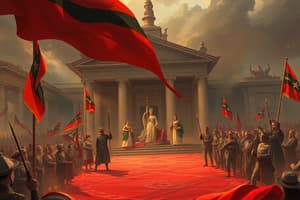Podcast
Questions and Answers
What was a consequence of the Balkan Wars of 1912-1913?
What was a consequence of the Balkan Wars of 1912-1913?
- The Balkan states united under a single government.
- The Ottoman Empire gained significant territory.
- The Austro-Hungarian Empire expanded its borders.
- The Ottoman Empire lost significant territory to Balkan states. (correct)
What was the main concern of Austrian Germans in the Dual Monarchy of Austria-Hungary?
What was the main concern of Austrian Germans in the Dual Monarchy of Austria-Hungary?
- They feared Hungarian dominance. (correct)
- They wanted to unify with Germany.
- They sought independence from Hungary.
- They sought to conquer Balkan states.
What was the main goal of Serbian nationalism in the late 19th and early 20th centuries?
What was the main goal of Serbian nationalism in the late 19th and early 20th centuries?
- Independence from Austria-Hungary.
- Unification with Greece.
- Unification of South Slavs. (correct)
- Expansion of the Ottoman Empire.
Who advocated for Italian unity and independence in the 19th century?
Who advocated for Italian unity and independence in the 19th century?
What event marked the failed coup attempt by Adolf Hitler in 1923?
What event marked the failed coup attempt by Adolf Hitler in 1923?
What was the result of the Wars of Italian Independence from 1848 to 1866?
What was the result of the Wars of Italian Independence from 1848 to 1866?
Flashcards are hidden until you start studying
Study Notes
Nationalism in Europe
Ottoman Empire's Decline
- Late 19th and early 20th centuries saw the decline of the Ottoman Empire
- Nationalist movements emerged in the Balkans, leading to independence from Ottoman rule
- Key events:
- Balkan Wars (1912-1913): Ottoman Empire lost significant territory to Balkan states
- World War I: Ottoman Empire sided with Central Powers, leading to further decline
Austrian and Hungarian Nationalism
- Dual Monarchy of Austria-Hungary (1867-1918)
- Austria: German-speaking, dominated government
- Hungary: Magyar-speaking, sought greater autonomy
- Nationalist tensions:
- Austrian Germans feared Hungarian dominance
- Hungarians sought independence or equal status
- Key event:
- Ausgleich (1867): Compromise establishing Dual Monarchy, granting Hungary autonomy
Balkan Nationalism
- Late 19th and early 20th centuries saw rise of nationalism in Balkan states
- Key countries:
- Serbia: sought unification of South Slavs
- Bulgaria: sought independence from Ottoman Empire
- Greece: sought expansion and unification of Greek-speaking territories
- Key events:
- Balkan Wars (1912-1913): Balkan states fought against Ottoman Empire, leading to further independence
- Creation of Yugoslavia (1918): merger of South Slav states
Unification of Italy
- 19th century saw rise of nationalist movement in Italy
- Key figures:
- Giuseppe Mazzini: advocated for Italian unity and independence
- Giuseppe Garibaldi: led military campaigns for unification
- Victor Emmanuel II: King of Sardinia, later King of Italy
- Key events:
- Risorgimento (1815-1871): movement for Italian unification
- Wars of Italian Independence (1848-1866): led to unification of Italy
Rise of Nazi Germany
- Interwar period (1918-1939) saw rise of Nazi Party in Germany
- Key figure:
- Adolf Hitler: Nazi leader, advocated for German nationalism and expansion
- Key events:
- Beer Hall Putsch (1923): failed coup attempt by Hitler
- Nazi Party's rise to power (1930s): Hitler became Chancellor (1933), then Führer (1934)
- Aggressive expansion (1930s-1940s): remilitarization of Rhineland, Anschluss with Austria, invasion of Czechoslovakia and Poland
Studying That Suits You
Use AI to generate personalized quizzes and flashcards to suit your learning preferences.




